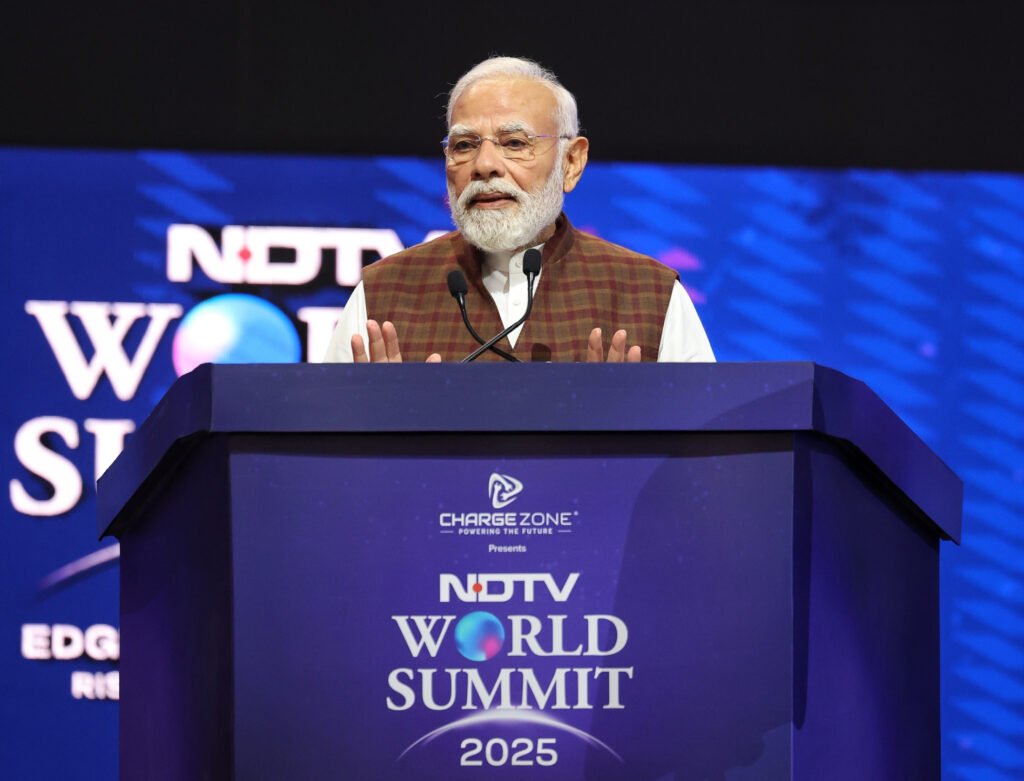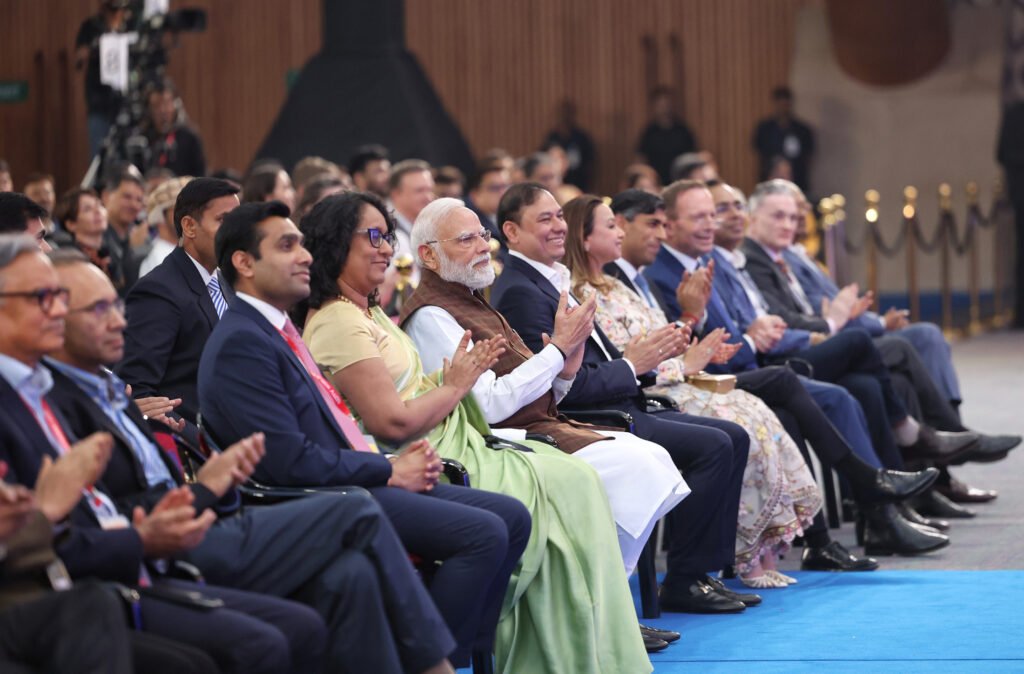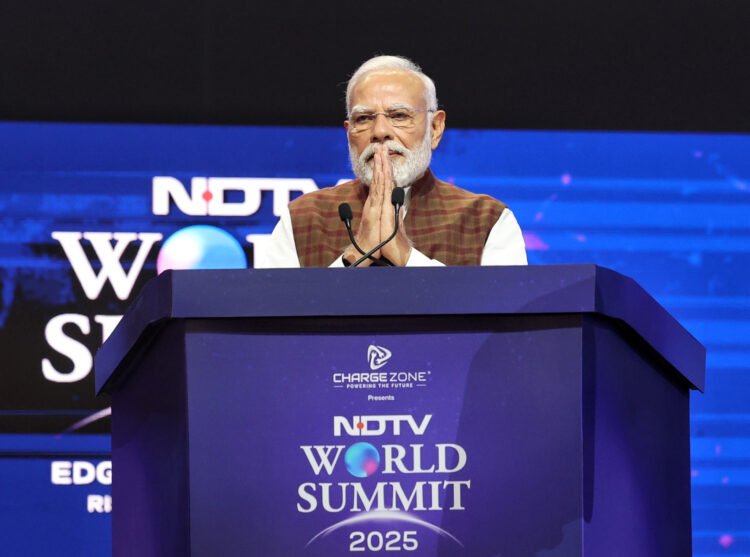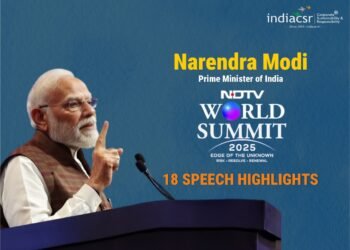At the NDTV World Summit 2025 in New Delhi, Prime Minister Narendra Modi’s rousing address on “Unstoppable India” outlined a blueprint of confidence, reform, and resilience that every business leader should understand.
At the NDTV World Summit 2025 in New Delhi, Prime Minister Narendra Modi delivered a defining speech that resonated far beyond politics — it was a masterclass in leadership, resilience, and nation-building. Speaking on the theme “Unstoppable India,” he outlined how the world’s largest democracy has transformed itself from a fragile economy into one of the world’s most confident and forward-looking nations. Addressing global business leaders, policymakers, and innovators, Modi painted a vision of India that refuses to pause — a country that turns every risk into reform, every reform into resilience, and every resilience into revolution.
With examples ranging from India’s home-grown 4G technology and AI investments to the historic reduction in Maoist terrorism and record-breaking exports, the Prime Minister’s address provided a roadmap for leadership in the modern age — built on self-belief, inclusivity, innovation, and compassion. For today’s business leaders, his words serve as both a mirror and a message: progress demands courage, reform requires conviction, and success is sustained only when growth walks hand in hand with dignity.
Here are 12 key highlights from PM Modi’s address that every business leader must know — each carrying a powerful insight into India’s unstoppable rise.
1. India’s Momentum is Unstoppable
Prime Minister Narendra Modi began with an energetic declaration: “India is not in the mood to stop today.” He stressed that 140 crore Indians are moving forward together with full determination, and the spirit of unity is propelling the nation’s progress.
He reminded the audience that in a world filled with “speed breakers,” India continues to accelerate. The Prime Minister’s statement embodies the nation’s entrepreneurial energy—where every citizen, startup, and enterprise contributes to a collective rise. This message resonates with business leaders: sustained growth demands shared purpose and unstoppable willpower.
***
2. From Fragile Five to Top Five
Recalling India’s economic position before 2014, Modi said the nation was once counted among the “Fragile Five.” Eleven years later, it stands proudly among the top five global economies. Inflation is under control at around 2%, while growth has crossed 7%.
He linked this turnaround to disciplined policymaking and a reform-driven approach that eliminated uncertainty. India’s ability to grow steadily while other economies fluctuate demonstrates resilience. For corporate leaders, this transition underscores that consistent policy and credibility can convert vulnerability into global leadership.
***

3. Self-Reliance: From Chips to Ships
“From chips to ships, India is self-reliant,” Modi declared, showcasing India’s journey from dependency to confidence. This transformation spans industries—semiconductors, defense, renewable energy, and shipbuilding—reflecting a holistic vision of Atmanirbhar Bharat.
The Prime Minister cited BSNL’s launch of an indigenous 4G stack as a national milestone, making India one of only five countries in the world with such technology. For business leaders, the message is clear: self-reliance isn’t isolation—it’s empowerment through innovation.
4. India’s Growth is Shaping Global Opportunities
“India’s growth today is shaping global opportunities,” Modi asserted. He pointed to major international commitments such as Google’s $15 billion AI investment and $100 billion in promised EFTA trade inflows.
The Prime Minister highlighted that India’s agricultural exports reached ₹4.5 lakh crore last year, merchandise exports grew by nearly 7%, and trade with G7 nations surged over 60%. India is now seen as a growth engine for the world. For business leaders, these facts reveal a country that is not just a market—it’s a multiplier of global prosperity.
***
5. A Reliable and Resilient Global Partner
Modi proudly noted, “The entire world today sees India as a reliable, responsible, and resilient partner.” From pharmaceuticals to fintech and from green hydrogen to mobile manufacturing, India’s partnerships are deepening across continents.
He cited that global companies now regard India as a dependable production and R&D base due to political stability and reform consistency. Business leaders must interpret this as India’s evolution from a support market to a trusted strategic ally in global supply chains.
***
6. Turning Risks into Reforms, Reforms into Revolutions
“Every risk has been turned into reform, every reform into resilience, and every resilience into revolution,” Modi declared. The line reflects a philosophy of fearless innovation and continuous transformation.
He recalled how, during the pandemic, India developed its own vaccines, produced billions of doses, and emerged as the fastest-growing major economy despite global disruptions. This adaptive leadership mindset—seeing crisis as opportunity—is a valuable lesson for every CEO navigating global uncertainty.
***
7. Democratizing Policy and Process
Modi underlined that over the past eleven years, his government has worked to “democratize both policy and process.” This shift has dismantled layers of red tape and replaced bureaucratic privilege with transparent governance.
He offered examples from the financial sector, where bank nationalization once excluded the poor, but the Jan Dhan Yojana brought 50 crore citizens into formal banking. For enterprises, democratization has meant simplified GST, digital compliance, and reduced regulatory friction—making India’s economic environment more inclusive and agile.
***
8. Digital India: Powering Financial Inclusion
Highlighting India’s digital revolution, the Prime Minister noted that 50% of the world’s real-time digital transactions now occur in India through UPI. The e-Sanjeevani platform has facilitated 42 crore medical consultations, empowering even remote villages with tele-medicine access.
Modi added that every village now has at least one banking touchpoint, and digital identity has become a symbol of empowerment. For corporate leaders, this ecosystem demonstrates how technology can democratize access, reduce costs, and unlock new consumer segments—offering lessons in scalable innovation.
***

9. From Bureaucratization to Empowerment
Criticizing the earlier system where citizens feared approaching banks, Modi emphasized how policy reform has transformed the financial culture. Loans worth lakhs of crores are now disbursed without collateral to women’s groups, farmers, and street vendors under schemes like PM SVANidhi and Mudra Yojana.
He contrasted this inclusive approach with the previous bureaucratic model that stifled growth. The message for business leaders is profound—real progress happens when power is decentralized and trust replaces control. Empowerment breeds enterprise.
***
10. Development with Dignity and Speed with Sensitivity
“Development must walk hand in hand with dignity,” Modi said, explaining that the government’s mission goes beyond growth—it seeks to enhance quality of life with compassion. Policies like Ayushman Bharat have saved Rs. 1.25 lakh crore for poor patients, while PM Jan Aushadhi has reduced medicine costs by 80%.
He also cited the drop in data prices from Rs. 300 per GB to just Rs. 10, saving citizens thousands annually. These examples show how inclusive policymaking supports both social welfare and consumer spending—creating a healthier domestic market for businesses.
***
11. A Nation Freed from Fear and Injustice
Turning to internal security, Modi said, “Maoist terrorism is a great injustice and a grave sin against the nation’s youth.” He revealed that Naxal-affected districts have declined from 125 to just 11, with only 3 severely impacted.
He shared that in the last 75 hours alone, 303 Naxalites surrendered, some carrying Rs.1 crore bounties. Bastar, once a conflict zone, now hosts the Bastar Olympics—a symbol of peace and progress. This shift shows how strong governance and development can coexist, ensuring businesses thrive even in previously inaccessible regions.
***
12. India’s Leadership Philosophy: Growth with Purpose
In his closing remarks, the Prime Minister said India’s journey toward becoming a developed nation is not just about GDP—it’s about “development with dignity and innovation with empathy.” He credited India’s people as the true architects of transformation.
He thanked the NDTV World Summit for its theme “Unstoppable India,” calling it a reflection of the nation’s collective confidence. For business leaders, the overarching message is to pursue growth that is ethical, inclusive, and resilient—growth that uplifts everyone involved in the process.
Download the full speech of Narendra Modi, the Indian Prime Minister
***
Final Takeaway: Lessons for Corporate Leadership
Every line of Modi’s address can serve as a leadership principle:
- Vision with momentum. (“India will neither stop nor pause.”)
- Reform through resilience. (“Every risk became reform.”)
- Empowerment through inclusion. (“We democratized policy and process.”)
- Innovation with empathy. (“Development must walk hand in hand with dignity.”)
- Confidence through self-reliance. (“From chips to ships, India is self-reliant.”)
India’s story is now a case study in leadership under pressure—an example of how conviction, reform, and people-first thinking can redefine a nation’s destiny.
Also Read: New India Doesn’t Endure Terror Silently, Says PM Modi on Operation Sindoor at NDTV World Summit 2025

















